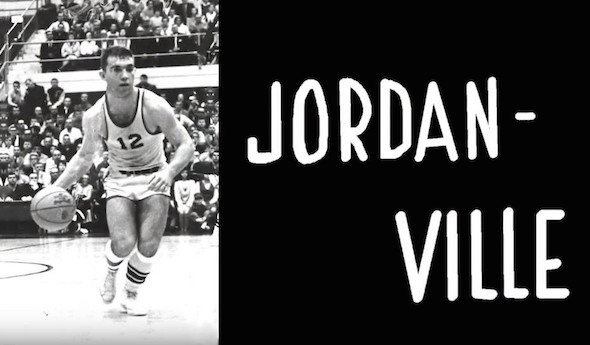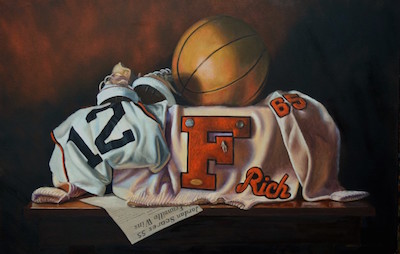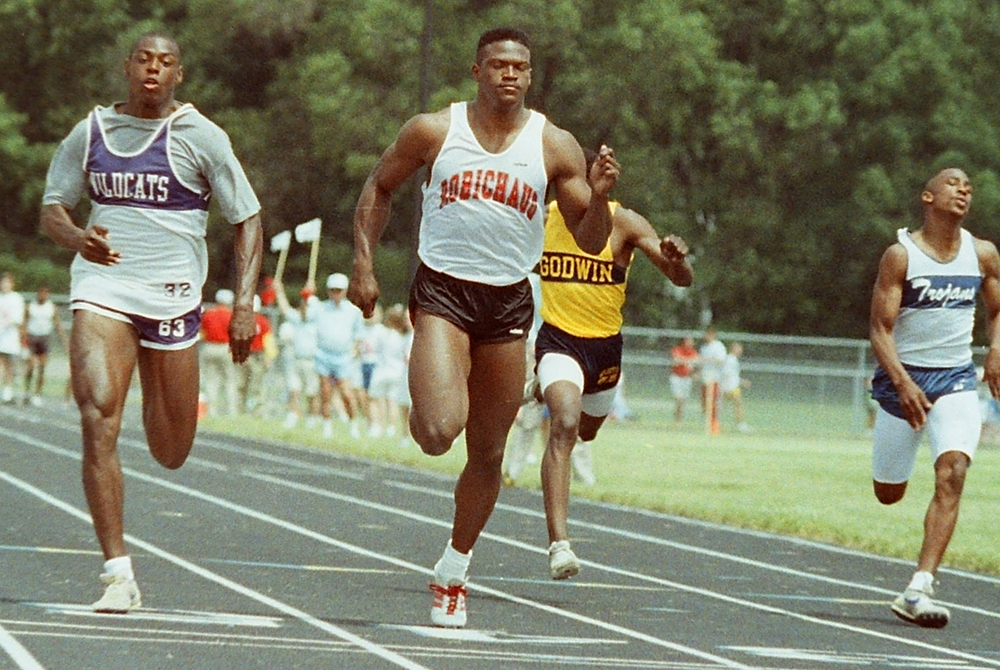
Film Fills In Picture of 'Fennville Flash'
By
Ron Pesch
MHSAA historian
December 28, 2017
We’ve been here before, but not in this way.
The last time was for a retrospective, covering one of the most impressive and awe-inspiring prep careers in Michigan high school history. That time was in print, and included a handful of still images that tried to illustrate the unbelievable.
But this time, the story is in documentary form. It’s woven together from grainy, scratched, faded silent film, a format of capturing memories familiar to thousands of people from generations past, as well as a series of modern-day high-resolution interviews.
Here, the basketball life of the athlete known as the “Fennville Flash” delivers on many levels. Yes, there is a Richie Jordan.
JordanVille, a documentary by John Mooy & Anne Colton, recalls a time when legend spread via word of mouth, newsprint and AM radio.
While it’s hard to comprehend for many today, the exploits of our athletic heroes were formed by “poets in the press box” who sat with pencil and paper, a typewriter, a microphone or a telephone, and described to their audience what they witnessed. On the receiving end, readers and listeners conjured up visualizations based on the facts, phrases and superlatives designed to create an image.
“Traveling left to right on your radio dial” helped listeners feel they were a member of the crowd, seated in the stands, in on the action and a witness to the mayhem. “Packed to the rafters,” reminded fans the importance of what was happening. An exciting game, presented by those with skill, created an event you longed to see. If a broadcast couldn’t be picked up on a transistor or tube radio, the final result might not be known, at the earliest, until the following day’s newspaper arrived.
I’ve told Jordan’s story via the MHSAA before; how he latched on to athletic training, weights and repetition to mold himself into a well-rounded athlete, able to leap to heights unexpected for a kid with a 5-foot-7 frame. The tales of his unfathomable accomplishments slowly leaked beyond the city limits of Fennville into Kalamazoo and greater Southwestern Michigan, then to Detroit. When Detroit Free Press writer Hal Schram relayed Jordan’s feats, the secret traveled across the state and beyond its drawn borders.
From there the legend of Jordan’s accomplishments grew. In Fennville, as in many small towns across the country, the city shut down when a game was played. The Jordan story was so enticing that thousands would travel vast distances to see him play with their own eyes. Today, his single season scoring average of 44.4 points per game during the 1964-65 campaign still remains the top mark in the MHSAA record book.
 JordanVille runs just shy of a half hour. Contained within is insight into the athlete that is challenging to relay in print form. Thanks to access to home movies and a series of interviews with Jordan, former teammates, past opponents and his high school coach, the determination, dedication and drive of a kid who wouldn’t let physical size be a deterrent from achievement radiates from the screen. On display is small town America at its finest, and perspective formed over 50+ years.
JordanVille runs just shy of a half hour. Contained within is insight into the athlete that is challenging to relay in print form. Thanks to access to home movies and a series of interviews with Jordan, former teammates, past opponents and his high school coach, the determination, dedication and drive of a kid who wouldn’t let physical size be a deterrent from achievement radiates from the screen. On display is small town America at its finest, and perspective formed over 50+ years.
For Mooy, it completes a filmmaking journey started six years ago. But the story of Jordan, in his eyes, date back to his school days. Mooy first heard about Jordan as a 7th-grader from a math teacher. A second-team all-St. Joseph Valley League selection, Mooy played at Marcellus High School and scrimmaged against Jordan and the Fennville Blackhawks.
He couldn’t believe his eyes.
“Everyone wanted to see this kid play,” said Mooy in 2011. “He was the first high school player I saw sign an autograph.
Today, with the interviews complete, and the film ready for viewing, Mooy sees more than just a sports story:
“With the benefit of years now passed, I look at the Rich Jordan story with a new respect. JordanVille created a place that was welcoming no matter who you were, or what color your skin happened to be. It was the 1960s. Rich was growing up Jewish, the Civil Rights Movement was in full swing, and the Vietnam War was on everyone's mind. And in Fennville, Michigan, from 1961 to 1965, the Jordan high school years, there were lessons beyond sports being learned by everyone that would last a lifetime. The Jordan household, under the guidance of (his parents) Tuffy and Sylvia Jordan, is where the story begins."
The film speaks of a time that has departed. Competition for our attention was less focused; phones hung on walls or sat on tabletops, communities were tighter, the training table featured peanut butter and chocolate milk instead of protein powder. A city could easily be renamed for a day.
The film also reminds us that those days were far from perfect.
If all goes as planned, the public will see the finished product come the flip of the calendar. In West Michigan, JordanVille is scheduled to show on New Year’s Day at 6 p.m. on WGVU, and will repeat on WGVU-Life at 7:30 p.m., Friday, Jan. 5.
Seek it out, and spread the word, just like in days of old.
 Ron Pesch has taken an active role in researching the history of MHSAA events since 1985 and began writing for MHSAA Finals programs in 1986, adding additional features and "flashbacks" in 1992. He inherited the title of MHSAA historian from the late Dick Kishpaugh following the 1993-94 school year, and resides in Muskegon. Contact him at [email protected] with ideas for historical articles.
Ron Pesch has taken an active role in researching the history of MHSAA events since 1985 and began writing for MHSAA Finals programs in 1986, adding additional features and "flashbacks" in 1992. He inherited the title of MHSAA historian from the late Dick Kishpaugh following the 1993-94 school year, and resides in Muskegon. Contact him at [email protected] with ideas for historical articles.
PHOTOS: (Top) Richie Jordan runs Fennville's offense during his thrilling high school career in the 1960s. (Middle) Jordan memorabilia, as captured by Bill Williams.

Robichaud 3-Sport Legend Wheatley Selected to National High School Hall of Fame
By
Geoff Kimmerly
MHSAA.com senior editor
March 11, 2024
The playing career of 1991 Dearborn Heights Robichaud graduate Tyrone Wheatley remains one of the most storied in Michigan high school sports history. His prestige gained during that early stage of his athletic stardom has been recognized nationally as well, as Wheatley was one of 12 honorees announced today as this year’s inductees into the National High School Hall of Fame by the National Federation of State High School Associations (NFHS).
Wheatley – who grew up in Inkster and is currently the head football coach at Wayne State University – will be inducted as one of 11 honorees selected for the 41st Hall of Fame class at a ceremony during the NFHS summer meeting July 1 in Boston. The rest of the class is made up of three more athletes, four coaches, two former state association administrators and a game official. Wheatley was nominated by the Michigan High School Athletic Association.
Wheatley will become the Hall of Fame’s 10th inductee from Michigan, joining the MHSAA’s first full-time Executive Director Charles E. Forsythe (inducted 1983), River Rouge boys basketball coach Lofton Greene (1986), Warren Regina athletic director, softball and basketball coach Diane Laffey (2000), Fennville basketball and baseball standout Richie Jordan (2001), Grosse Pointe Woods University Liggett boys and girls tennis coach Bob Wood (2005), Bloomfield Hills Cranbrook hockey standout Jim Johnson (2007), Owosso football, basketball and baseball all-stater Brad Van Pelt (2011); Vermontville Maple Valley baseball national record holder Ken Beardslee (2016) and retired MHSAA Executive Director John E. “Jack” Roberts (2022).
To the greater public, Wheatley surely is best known as a star running back for University of Michigan who went on to play 10 seasons in the NFL for the New York Giants and Oakland Raiders. However, he is arguably most glorified in Michigan high school athletics for his accomplishments on the track, where as a junior in 1990 he became the first (of still only two) athletes to win four individual events at an MHSAA Lower Peninsula Finals – placing first in the 100 and 200-meter dashes, 110-meter hurdles and long jump. He led Robichaud to the Class B team title that day, scoring 40 of its 49 points. Wheatley completed his high school career in 1991 with three more Class B individual track & field championships and nine total over his final three seasons; he was injured in the 100 during that senior-year meet and could not run his final race to attempt another four-title day.
Wheatley’s meet records of 13.7 seconds in the 100 at the 1991 LP Class B Final and 23-10¾ in long jump in 1989 still stood when the four-Class track & field format was retired after the 1999 season. He also remains the only athlete to win the 100 three times at the prestigious Mehock Relays in Mansfield, Ohio, also finishing first in the 110 hurdles and 200 and runner-up in the long jump at that meet in 1991.
Wheatley was similarly accomplished on the high school football field, leading his team to a state championship in 1990 and earning a Parade All-America honor. Over three varsity seasons total he ran for a combined 4,257 yards and 67 touchdowns, including 2,010 yards and 33 scores on 208 carries as a senior in 1990 – the latter despite playing quarterback half of that season (and throwing five touchdown passes). He played quarterback, running back, defensive back, punter, kicker and returned kicks, and he scored 252 points over 13 games as a senior and 484 over 38 career games.
Wheatley also was a standout on the basketball court for Robichaud, averaging 14 points and 16 rebounds per game as a senior in earning all-state recognition in that sport as well.
“My city where I come from, Inkster, means the world to me. I grew up in an incredible era of sports in Michigan (with successful University of Michigan and Detroit pro teams) … but if you ask me who my idols were, they were the guys I grew up with playing on the playground,” Wheatley said. “After you come from a basketball game where you see Jarvis Walker drop 30, or Earl Jones running the last 200 of a race backwards … you hear people talk about them, you hear their reverence about them, and I just wanted to be put in the conversation of the best to come out of Inkster, forget the state. I can tell you this for sure: I’m not the best athlete to come out of Inkster, just the person who got the recognition. And my foundation was built watching, taking notes, preparing, working out and just trying to be one of the guys.
“(Robichaud was) the step. Because without Robichaud … Michigan, the NFL, me coming back to coach, it doesn’t happen,” Wheatley said. “Without the Robert Yaucks (his football coach at Robichaud), the Coach (Leit) Jones (his Robichaud track coach), the Coach (Mercer) Brysons, the (coach) Wade Cooks, the (coach Jeff) Flounorys, the Millie Hursins (his academic advisor) of the world, this doesn’t happen. Without my high school teammates, none of this happens. So it’s not just a step. What’s the saying – the first impression is the lasting and best impression? Robichaud was it.”
Wheatley returned to Robichaud as its varsity football coach in 2007 and led that team to a 9-2 record and the MHSAA Playoffs for the first time since 1994 – after Robichaud had finished 0-9 the previous season. He has served as an assistant football coach at four college programs including U-M and Syracuse, and with the Buffalo Bills, Jacksonville Jaguars and Denver Broncos.
He also served as Morgan State University's head coach from 2019-21 and just completed his first season as head coach at Wayne State, which finished 3-8 – an improvement of two wins from 2022 and the program’s best record since 2019.
Wheatley graduated from University of Michigan in 2008 with a bachelor’s degree in kinesiology. He and wife Kimberly have five children: Tyrone Jr., Terius, Tyrique, Tiana and Tamari. Tyrone Jr., an offensive tackle, played this past season for the New England Patriots.
“Many of us who grew up in Michigan grew up as fans of Tyrone Wheatley because of what he accomplished at the college level – but his legendary story begins at Dearborn Heights Robichaud, where his outsized athletic ability was on full display in every sport he played,” MHSAA Executive Director Mark Uyl said. “Michigan has produced several professional athletes in a variety of sports and nearly 50 Olympians in track & field alone, and what Tyrone Wheatley achieved as a high school athlete remains a standard few have approached. We are ecstatic that he will deservedly take his place among the all-time elite high school athletes nationally as well.”
The National High School Hall of Fame was started in 1982 by the NFHS. The 11 individuals were chosen after a two-level selection process involving a screening committee composed of active high school state association administrators, coaches and officials, and a final selection committee composed of coaches, former athletes, state association officials, media representatives and educational leaders. Nominations were made through NFHS member associations. Also chosen for this class were athletes Joe Mauer (Minnesota), Takeo Spikes (Georgia) and Dot Ford Burrow (Mississippi); sport coaches Paula Kirkland (South Carolina), Gary Rankin (Tennessee), Roy Snyder (Pennsylvania) and Ronald Vincent (North Carolina); former state association administrators Mike Colbrese (Washington) and Marie Ishida (California), and baseball/football game official David Core (Oklahoma).
For more on this year’s Hall of Fame class, visit the NFHS Website.
PHOTO Tyrone Wheatley crosses the finish line first during one of his nine MHSAA Finals track & field championship victories. (MHSAA file photo.)

